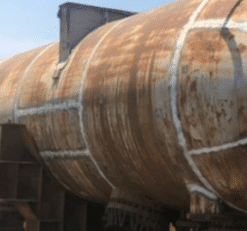Combatting Corrosion in Pyrometallurgical Metal Recycling: Furnaces, Autoclaves, Dryers, and Gas Scrubbers

The Challenge of Metal Recycling Corrosion
Metal recycling plays a vital role in resource conservation and sustainable manufacturing. However, the harsh conditions within pyrometallurgical furnaces, autoclaves, dryers, and gas scrubbers can lead to significant corrosion challenges. This corrosion not only impacts equipment longevity but can also hinder production efficiency and product quality.
Impact of corrosion in the Green Metals Recycling Industry
Corrosion, characterized by the gradual deterioration of materials through chemical or electrochemical reactions with their environment, emerges as a formidable adversary in the metals recycling industry. This phenomenon compromises the integrity, quality, and safety of materials destined for reuse or recycling. It also inflates the costs associated with the maintenance and replacement of equipment and components, representing a significant economic burden for industries. Beyond these direct costs, corrosion exerts a detrimental influence on the efficiency of recycling processes.
From an environmental perspective, metal recycling corrosion introduces additional complexities into the production lifecycle. Consequently, the effective management and prevention of corrosion become imperative both economically and environmentally to facilitate a successful transition towards sustainable practices in the industry.
IGS has extensive experience providing surface protection to critical equipment in smelting and converting processes utilized in metal recycling.
Smelting and Converter Furnaces (TSL-type)
- High Temperatures: Extreme temperatures accelerate chemical reactions, including oxidation and sulfidation.
- Aggressive Slag and Matte: Molten slag and matte are highly corrosive, attacking refractory linings and metal components.
- Gaseous Environments: Sulfur dioxide, chlorine, and other gases can react with metals, forming corrosive compounds.
Autoclaves
- High-Pressure Steam: The combination of heat and pressure can exacerbate corrosion, particularly in the presence of chlorides or other contaminants.
- Chemical Leaching: Leaching solutions used for metal extraction can be highly acidic or alkaline, leading to corrosive attack.
Dryers
- Moisture and Acidity: Residual moisture and acidic residues from previous processes can create a corrosive environment.
- Elevated Temperatures: Drying processes often involve high temperatures, which can accelerate corrosion reactions.
Gas Scrubbers
- Acidic Scrubbing Solutions: Solutions used to remove pollutants from exhaust gases are often acidic, promoting corrosion.
- Wet-Dry Cycling: The repeated wetting and drying of scrubber components can create stress and accelerate corrosion.
On-Site Alloy Upgrade as a Metal Recycling Corrosion Mitigation Solution
Integrated Global Services specializes in providing comprehensive metal recycling corrosion solutions. Our expertise spans materials selection and on-site alloy cladding.
We Offer:
- Corrosion-Resistant Materials: Selection and implementation of high-performance alloys and slag-release linings specifically designed for the harsh conditions of metal recycling.
- Protective Cladding: In-situ application of High Velocity Thermal Spray (HVTS) alloy cladding to create a barrier against corrosive attack.
- Slag-Shedding Coatings: high-temperature ceramic coatings that help minimize slug buildup and keep the surface cleaner for longer.
- Expert Consultation: Collaboration with experienced metallurgists and corrosion engineers to develop customized solutions for your specific needs.
Implementing a Comprehensive Corrosion Management Strategy
Effectively combating metal recycling corrosion requires a holistic approach. IGS works closely with clients to develop tailored solutions that address the unique challenges of each facility. By combining advanced materials, innovative cladding techniques, process optimizations, and cutting-edge monitoring techniques, metal recyclers can significantly extend equipment life, reduce maintenance costs, and improve overall process efficiency.
Investing in corrosion prevention and mitigation strategies is essential for the long-term success and sustainability of metal recycling operations. As the industry continues to evolve and face new challenges, partnering with corrosion experts like IGS ensures that recyclers stay ahead of the curve in protecting their critical assets.
By implementing these comprehensive solutions, pyrometallurgical recycling facilities can minimize the impact of corrosion, improve operational efficiency, and contribute to a more sustainable circular economy for metals.
Corrosion Protection Solutions
Here, you can learn more about the specific solutions IGS provide to our metal recycling customers:
- TSL-type Smelter and converter Waste Heat Boilers corrosion-erosion mitigation
- Autoclave corrosion prevention
- Dryer corrosion prevention
- Gas scrubber corrosion mitigation
Conclusion
Corrosion poses a significant challenge in the metal recycling industry. By understanding the root causes and implementing proactive strategies, you can minimize corrosion, extend equipment lifespan, and enhance the efficiency and profitability of your operations.
